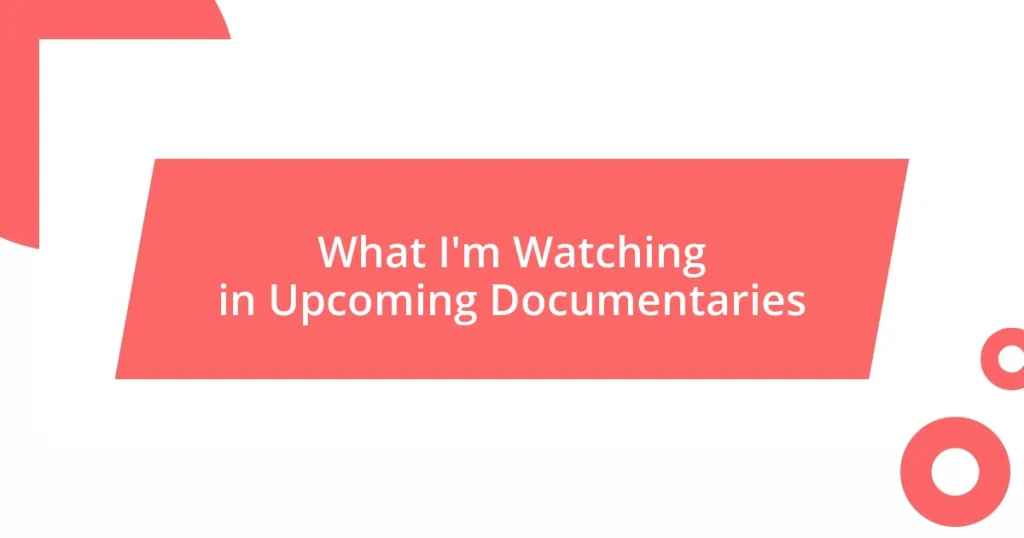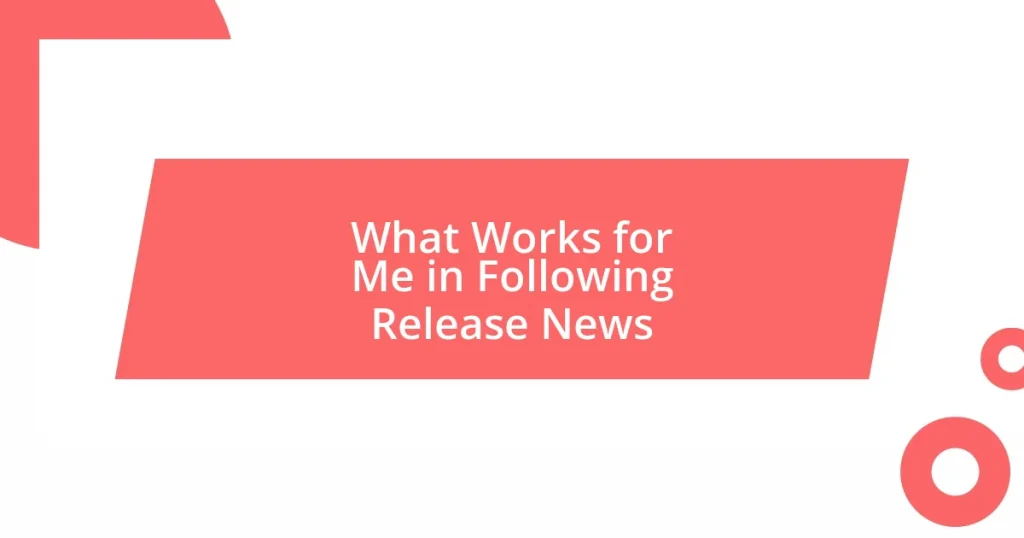Key takeaways:
- Release delays can arise from technical issues, quality assurance, resource availability, market strategy adjustments, and feedback incorporation, emphasizing the importance of understanding these factors to manage frustration.
- Implementing coping strategies such as focusing on anticipation, setting personal deadlines, and practicing patience can enhance the waiting experience and transform disappointment into positive engagement.
- Effective communication with stakeholders during delays fosters trust and loyalty, as acknowledging feelings and providing clear updates help manage expectations and maintain a connection.
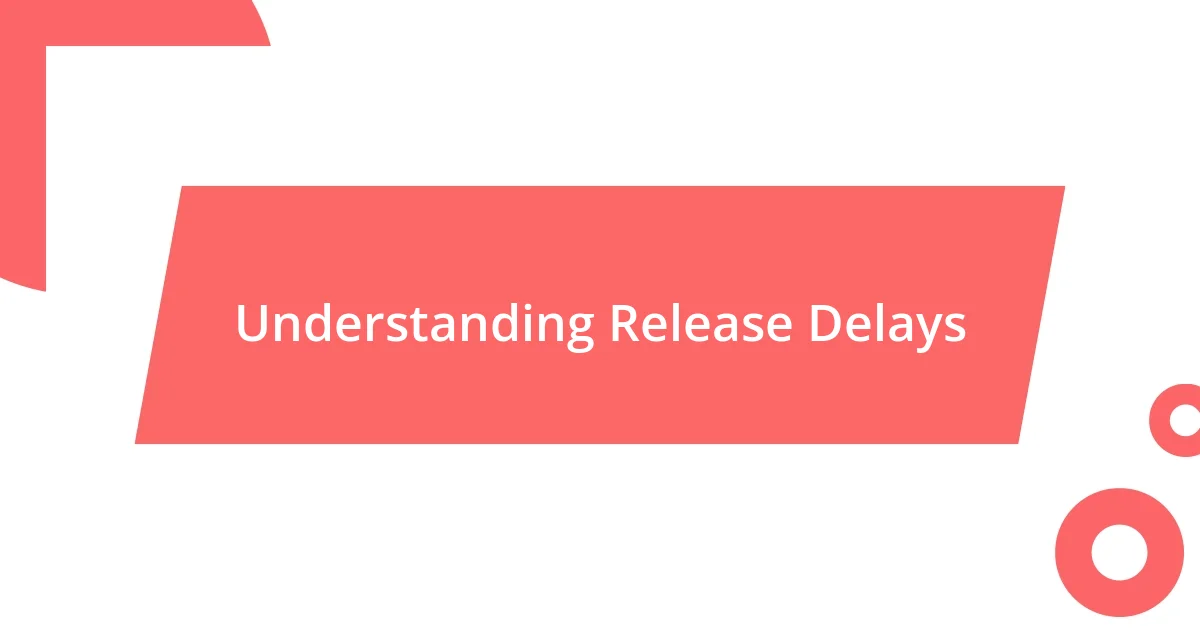
Understanding Release Delays
Release delays can be frustrating, especially when you’ve invested time and energy into anticipating a launch. I remember waiting for a much-hyped software update, and each day felt like a waiting game. Have you ever felt that pang of disappointment when a much-anticipated release gets pushed back? It’s a shared experience that can genuinely shift our emotions.
Understanding the reasons behind these delays is crucial. Sometimes, they stem from technical issues that require attention, while at other times, it’s about perfecting a product. I once encountered a situation where a game developer opted to delay a release to enhance gameplay. Reflecting on that, I realized the importance of quality over speed—wouldn’t you agree that a smoother product is worth a little more waiting?
Another aspect to consider is the impact of these delays on a company’s reputation. I recall a particular instance with a tech company that faced backlash after multiple postponements. It made me ponder: how do we differentiate between a clever marketing strategy and genuine concern for quality? The emotional responses we have to these delays often reveal much about our expectations and the industry’s culture.
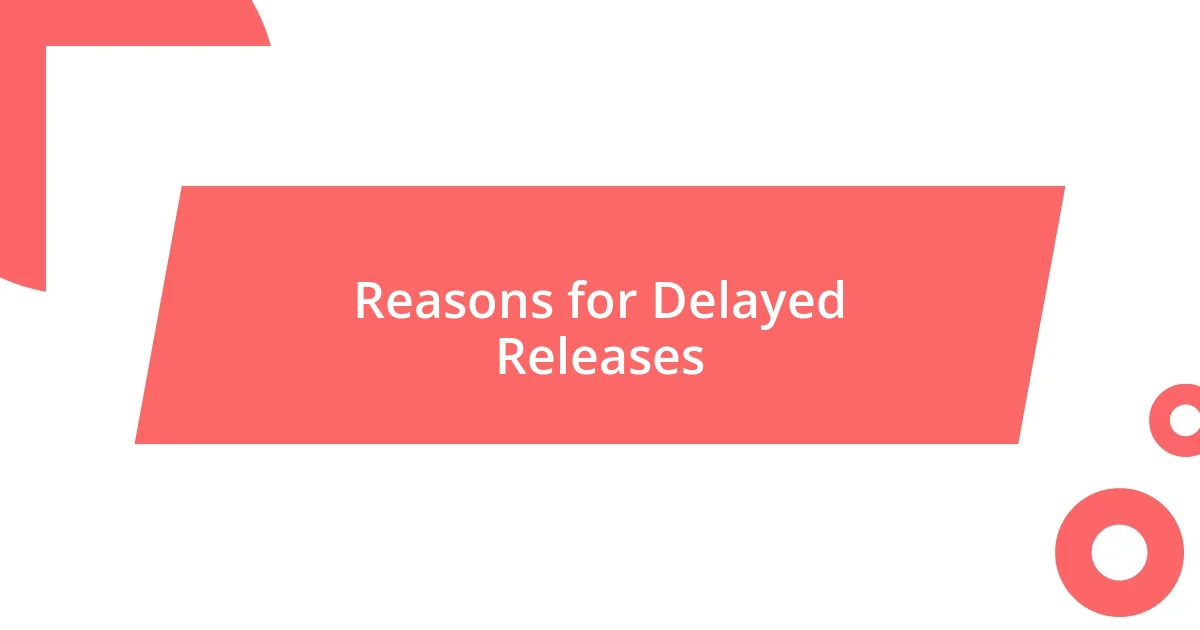
Reasons for Delayed Releases
Certainly! Let’s delve into the reasons behind delayed releases, enriched with personal insights and a conversational tone.
Delays in releases can often be traced back to several factors, each with its own layer of complexity. I remember a particular instance when a friend eagerly awaited a new gadget. Just a week before its launch, the company announced a delay due to unforeseen manufacturing issues. It was a stark reminder that sometimes, even the best-laid plans go awry because of reasons beyond control.
The following bullets highlight common causes for delayed releases:
- Technical Problems: Bugs and issues during final testing can push back timelines.
- Quality Assurance: Companies often delay to ensure the product meets high standards, prioritizing quality over speed.
- Resource Availability: Supply chain disruptions or staffing shortages can hinder progress.
- Market Strategy Adjustments: Companies occasionally choose to align their release schedule with market trends or competitor launches.
- Feedback Incorporation: They might need more time to integrate customer feedback or beta tester suggestions before the official launch.
Understanding these reasons can help ease the frustration of waiting. Reflecting on my own experiences, I can’t help but appreciate the craftsmanship behind a well-executed launch, even if it takes a bit longer to get there.
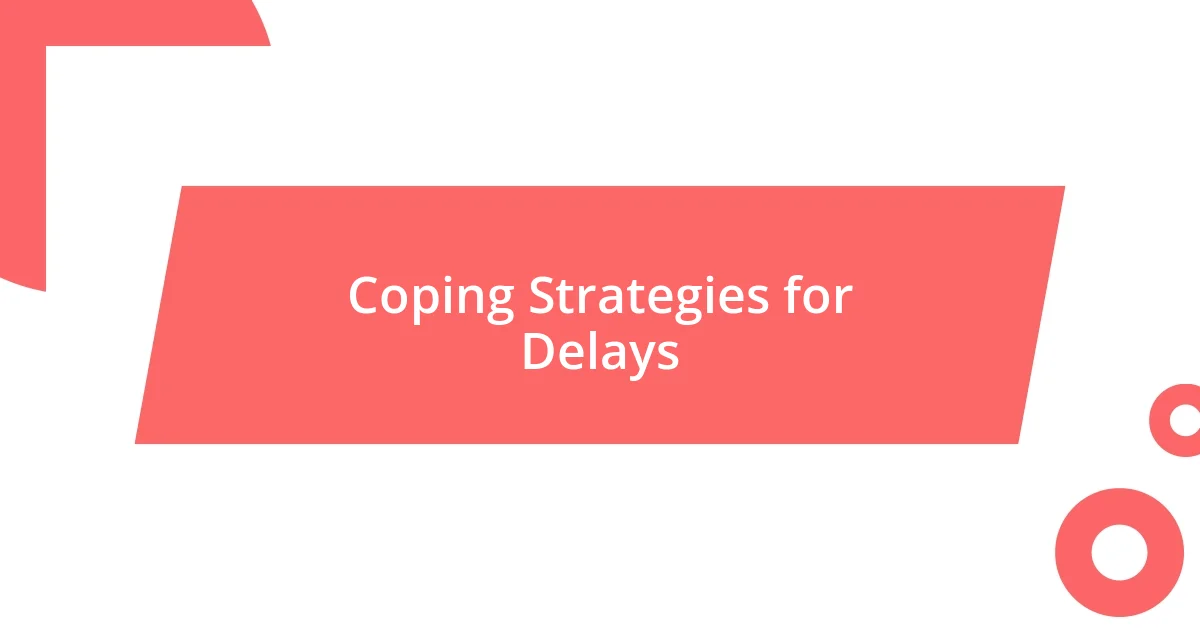
Coping Strategies for Delays
Certainly! It’s vital to develop effective coping strategies during delays, as they can often lead to unwarranted frustration. One of the strategies that has worked well for me is focusing on the anticipation itself. I remember when a favorite movie sequel was delayed. Instead of feeling disappointed, I redirected that energy into uncovering fun trivia about the first film and discussing theories with friends. Engaging in conversations about what to expect not only made the wait more enjoyable but also deepened my enthusiasm.
Another approach I’ve found helpful is setting personal deadlines to fill the waiting period. For instance, if a software release is pushed back, I might challenge myself to explore similar apps or learn new skills in that domain while I wait. This proactive approach not only keeps my mind occupied but also helps me feel productive. Have you ever turned wait time into an opportunity for growth?
Lastly, I’ve discovered that patience truly can be a virtue. Adopting a mindset of understanding the bigger picture often makes the waiting game easier. When a beloved game was postponed, I took a step back and realized that the extra time meant a richer, more refined experience ahead. Embracing the notion that delays often add value can make the process feel more rewarding, can’t it?
| Strategy | Description |
|---|---|
| Focus on Anticipation | Redirect energy to exploring related content or discussions. |
| Set Personal Deadlines | Engage in related activities that promote personal growth. |
| Practice Patience | Understand that delays can enhance the overall experience. |
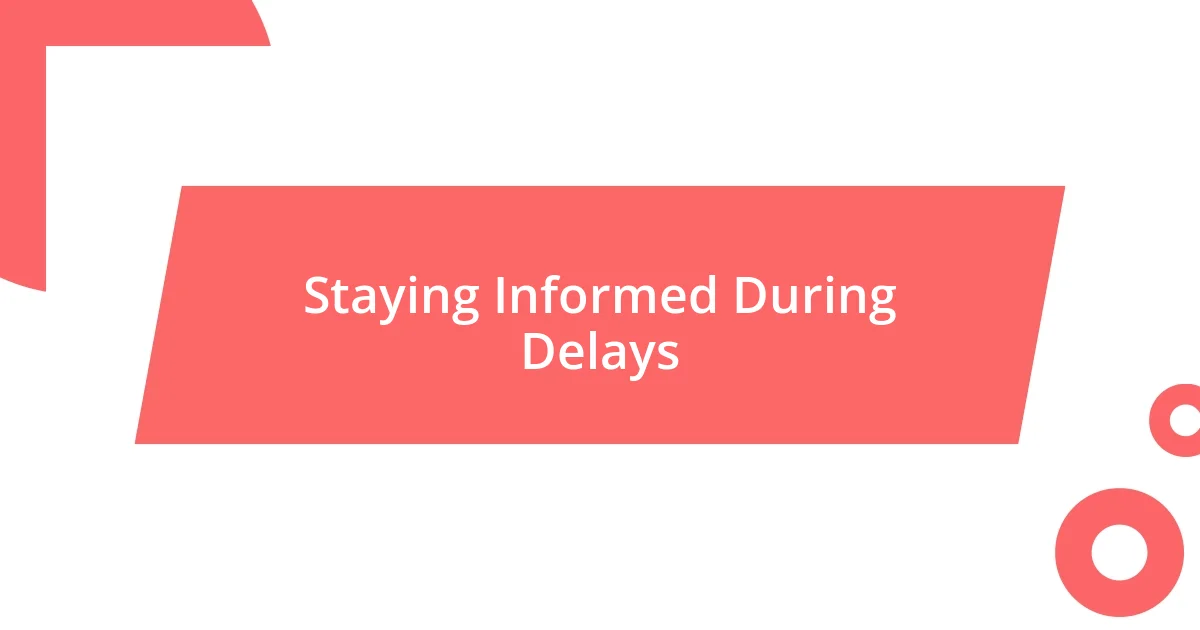
Staying Informed During Delays
Staying informed during delays is crucial, especially when your anticipation is high. I recall waiting for the latest smartphone release, participating in online forums to hear any updates. It became a daily ritual to refresh news feeds and social media accounts—I felt a mix of excitement and frustration, but staying engaged helped ease the waiting period. How often have you turned to social media for updates, only to find more questions than answers?
I’ve found that subscribing to official communication channels is invaluable. For instance, following the brand’s Twitter account or signing up for newsletters often leads to the quickest, most accurate information. When a new game I was eagerly awaiting was postponed, those updates from the development team gave me insight into their creative process. Knowing they were dedicated to making the game better made the delay feel less like a setback and more like a necessary step toward quality.
Engaging with communities of fellow fans can also be a game changer. I remember joining a discussion group where everyone was speculating about the reasons behind a movie delay. Sharing thoughts with others not only provided fresh perspectives but also fostered a sense of camaraderie. When you connect with others who share your enthusiasm, it transforms the waiting into a shared journey rather than an isolated experience. Have you ever found solace in discussing delays with fellow enthusiasts? It often helps to remind us we’re not alone in our anticipation.
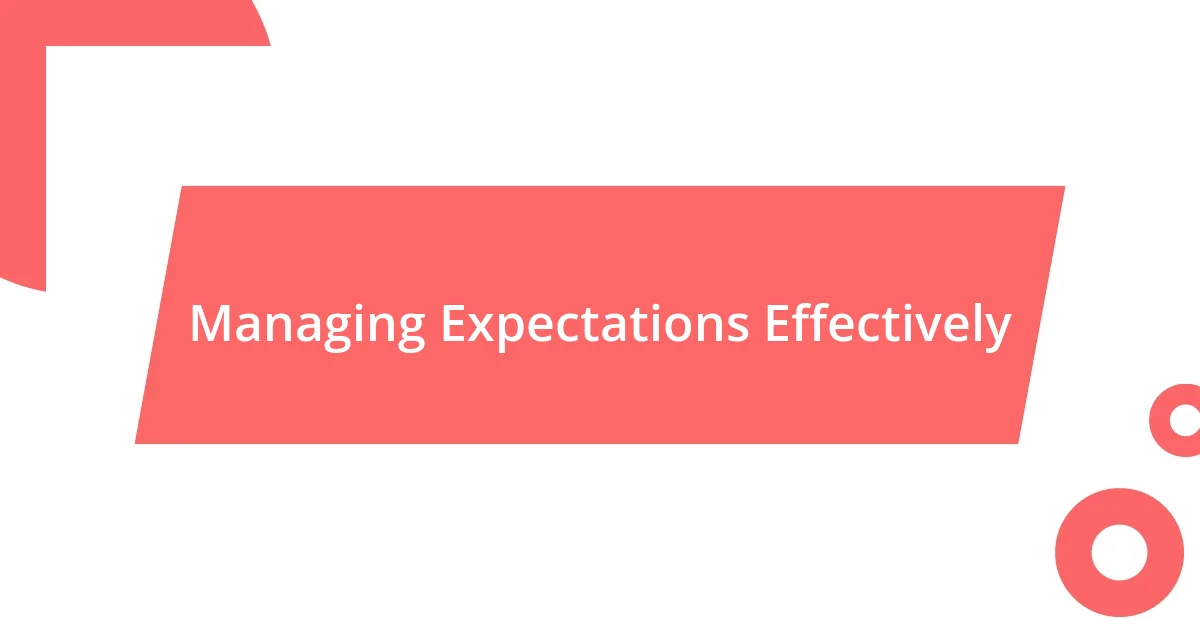
Managing Expectations Effectively
Managing expectations during delays can be a nuanced practice. I vividly recall a time when a highly anticipated game was supposed to release, but the launch date was pushed back. Initially, I felt a surge of disappointment, but then I redirected that energy into guessing plot twists and character arcs with my friends. Engaging in those discussions transformed my disappointed feelings into excitement, as they sparked creative conversations that allowed us to explore the universe of the game together.
Setting realistic expectations can also help in coping with delays. For instance, prior to the release of a long-awaited album, I decided to manage my anticipation by curating a playlist of the artist’s previous works. This not only allowed me to relive my favorite songs but also cultivated a sense of appreciation for their musical journey. Have you ever found comfort in revisiting past favorites while waiting for something new? It’s a great way to fill that gap, shifting your focus from what’s missing to what you already love.
Lastly, I’ve learned that flexibility in my expectations can significantly ease the waiting experience. When a highly anticipated series was postponed, I took that as an opportunity to explore new genres that I might not have tried otherwise. I discovered some hidden gems that I may not have encountered had I not been open to change. Isn’t it interesting how a delay can sometimes lead you to unexpected joys? Embracing these moments can not only reshape your anticipatory feelings but also enrich your overall experience.
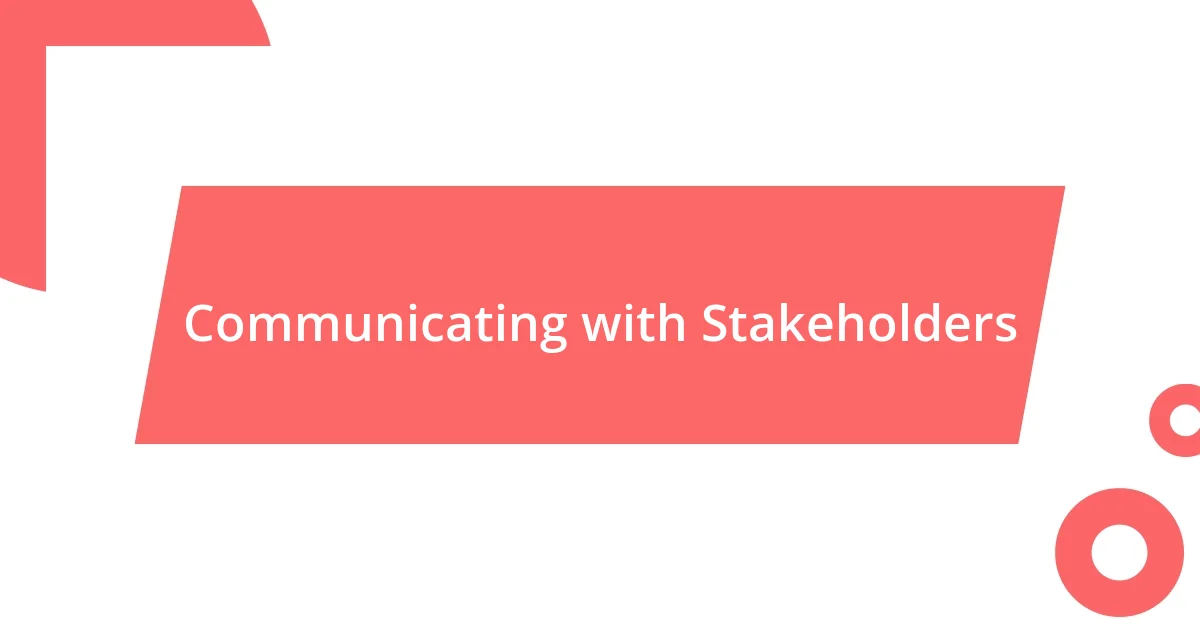
Communicating with Stakeholders
Communicating effectively with stakeholders during a delay is essential for maintaining trust. I remember a time when I was part of a team launching a new software update, and we encountered unexpected issues. Instead of going silent, we sent out regular emails to our users, outlining the progress we were making and providing transparency about the challenges. It was reassuring for stakeholders to see our commitment; they appreciated being in the loop and it ultimately reduced their anxiety around the delay.
Acknowledging stakeholders’ feelings is another crucial component of communication during delays. Last year, when one of my favorite bands postponed their tour, they posted heartfelt messages on social media, recognizing the disappointment fans felt. I found this approach not only humanized them but also strengthened the connection between the band and its audience. Have you ever felt more connected to a brand or person simply because they validated your feelings? Those moments resonate and foster loyalty.
It’s also important to provide actionable next steps for stakeholders. When we faced a setback with a project launch, I crafted a timeline of the new milestones and shared it with everyone involved. This clarity helped everyone understand what to expect next and re-engaged them in the process. Have you ever received a timeline after a delay? It can transform uncertainty into a renewed sense of purpose, making the waiting period feel more manageable.
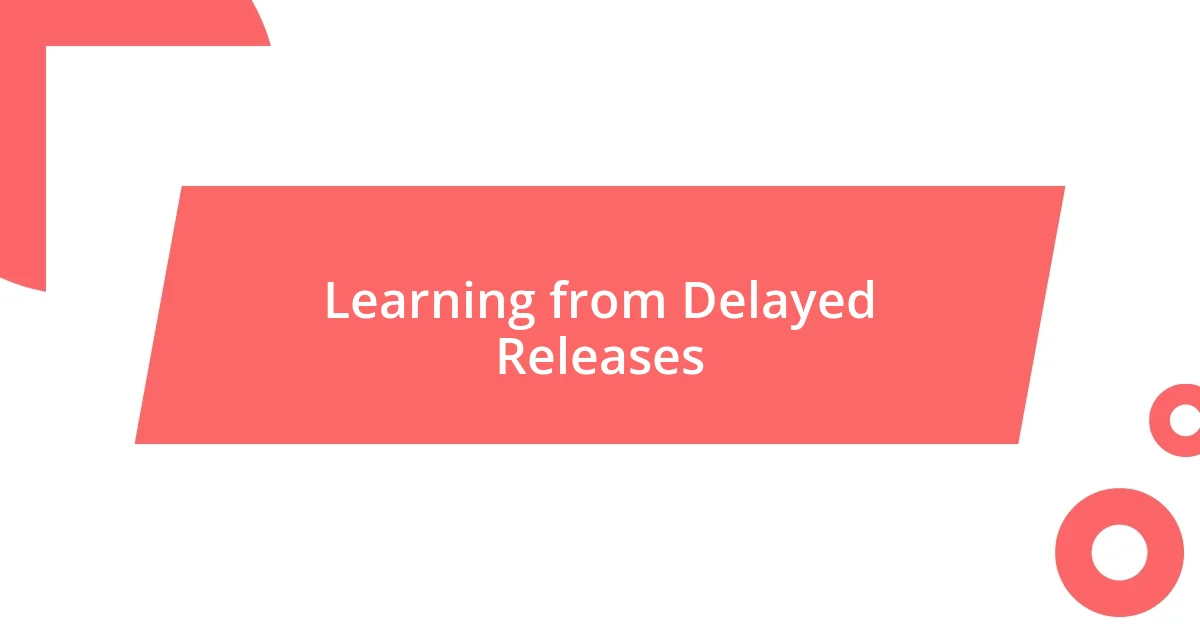
Learning from Delayed Releases
Learning from delayed releases can truly offer valuable insights if you allow yourself to reflect on the experience. I once found myself eagerly waiting for a new book release, only to discover the author had postponed it due to a personal crisis. Initially, I felt frustrated, thinking about all the time I had set aside. But as I read interviews with the author, detailing their creative process, I came to appreciate the necessity of taking that extra time to ensure the final product met their vision. Have you ever considered that a delay might be a sign of an artist’s commitment to quality?
Reflecting on these moments can deepen our understanding of the creative process. I remember a film that faced multiple delays, and when it finally premiered, the storytelling and character development were exceptional. It hit me that sometimes, good things really do take time. It made me think about how we, too, might rush through our own projects. Isn’t it a relief to know that it’s okay to take that extra time to cultivate excellence?
Furthermore, I find that delayed releases encourage us to reassess our relationship with anticipation. When facing those extra weeks or months of waiting, I learned to embrace the slowness and savor the journey. For example, while waiting for a long-awaited series, I allowed myself to dive into fan theories and discussions online. This not only kept my excitement alive but also deepened my appreciation for the story’s world. Has something similar happened to you? Embracing the wait can turn what might seem like a setback into an enriching learning experience.











